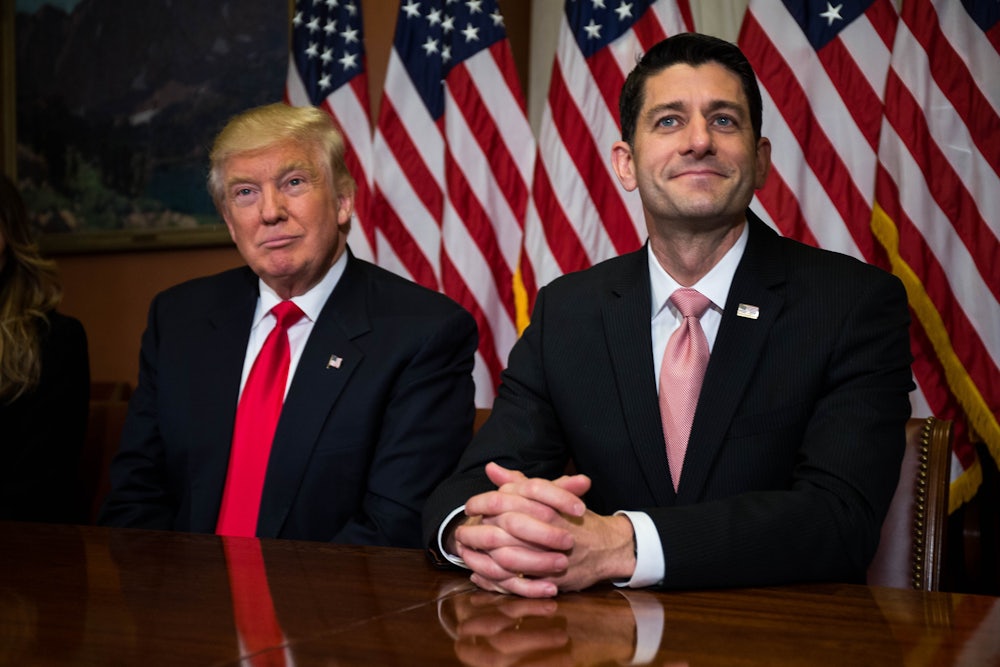The Republican Congress has been in desperation mood for months. In April, The Cook Political Report’s Amy Walter told PBS that Republicans were already frustrated about the lack of progress on their legislative agenda. “You’re seeing Republican enthusiasm wane,” she said. “I talk to a lot of Republicans who say, ‘Man, we have the House, we have the Senate, we have the White House. We still can’t get things done.’” In early July, weeks before John McCain submarined the Senate’s attempt to repeal Obamacare, the Associated Press reported that Republicans were “desperate” to get something done. In early October, after Congress had pivoted to tax reform, Politico reported that donors were fed up. “I’m sick and tired of nothing happening,” one said. On Tuesday, New York Republican Chris Collins made it clear who was driving the bus: “My donors are basically saying, ‘Get it done or don’t call me again.’”
This week, voters delivered a staggering rebuke of President Donald Trump and the congressional GOP, handing Democrats the governorship and a string of state legislature seats in Virginia, as well as the governorship in New Jersey. Democrats are hoping for a tidal wave in the 2018 midterms. Trump is blaming this tsunami on Republican candidates failing to embrace him. (In fact, the opposite is likely true.) Meanwhile, Republicans are trying to blame their stalled legislative agenda.
Hours after Democrat Ralph Northam routed Republican Ed Gillespie in Virginia, Politico reported that Ohio Senator Rob Portman was spinning the current crisis as an opportunity. Portman told conservative groups that the “results give Republicans even more of a reason to get results and get tax reform done.” Speaking to Fox News Radio’s Brian Kilmeade, Speaker Paul Ryan sang a similar tune. “The way I see it, honestly, is we’ve got to get our job done,” Ryan said. “That’s why I think tax reform is just so important, not just politically but just for the country.” This conventional wisdom is not new. In March, Trump and Ryan warned Republicans that they would face a “bloodbath” in 2018 if they didn’t start passing legislation.
This may help explain why the bills to repeal Obamacare and overhaul the tax code have been so shoddy and incoherent. Republicans are rushing, privileging political concerns over policy goals. But Portman and Ryan are also reading the results in Virginia the wrong way. Passing tax reform may give them an achievement to tout on the campaign trail, and it may even win over a disaffected Republican or two. But the results in Virginia suggest that Republicans are damned if they do pass tax reform and damned if they don’t. While Tuesday’s results have accurately been interpreted as reflecting the depths of Trump’s unpopularity, they also suggest that the GOP’s donor-focused legislation, which benefits the wealthiest Americans at the expense of everyone else, is just as unpopular.
According to exit polls, four in ten Virginia voters listed health care as their most important issue—these voters supported the Democratic candidate by 55 percentage points. That’s certainly a rebuke of Trump, who repeatedly pushed Congress to take up bills that would kick millions off their health insurance. But it’s also a rebuke of the Republican Congress that has tried to pass these bills. More broadly speaking, it was a rejection of the kinds of bills that Republicans like: bills that are “mean,” to use the president’s language, and too skewed toward the rich.
The House’s tax reform bill is the ne plus ultra of this kind of legislation. A new nonpartisan study reports that a quarter of all taxpayers will see a tax increase by 2027, but not the rich. This only makes the GOP’s problems more pronounced, since the bill is centered around a gigantic (and unnecessary) corporate tax cut and a series of tax breaks for the wealthy. The Senate version, which is expected to be unveiled on Thursday, reportedly will not eliminate the estate tax entirely, but it will limit its reach and wipe out deductions for upper middle class taxpayers in liberal states like New York.
It’s possible that Republicans believed that they could create a kind of (un)virtuous circle, in which they pass bills that benefit their donors, who in turn pump money into campaign advertising focused on divisive social and cultural issues. In Virginia, Ed Gillespie’s campaign was a test case of this strategy: In embracing race-baiting Trumpian issues like Confederate monuments and immigration, he tried to find a Goldilocks zone between an unpopular president and the xenophobic appeals that got the president elected. But on Election Day, it flopped: Democrats were energized and, even though six in ten voters thought Confederate monuments shouldn’t be removed, they apparently cared a lot more about health care.
In a different climate, Republicans could go back to the drawing board and rework the bill to lower the tax burden across the board, instead of pushing through a one percent–friendly bill for the sake of disgruntled donors. But an element of panic seems to be setting in: Republicans are operating under the delusion that if they can just pass something, anything, their fortunes will improve. Still, no matter how many times they try to spin it as a “middle class tax cut,” the bill is a giant corporate giveaway at the expense of a quarter of the country. It isn’t exactly the stuff campaign ads are made of.
Doing nothing isn’t a great alternative. The election in Virginia showed not just an energized Democratic base but a demoralized Republican base. Achieving nothing despite controlling both the legislature and the presidency would be a humiliating failure, and it would likely lead to many Republicans staying home in 2018. But passing a bad tax reform bill would only further horrify Democrats, as well as those few voters who occupy the middle. Yes, Trump remains the biggest drag on Republicans heading into 2018. But it shouldn’t be overlooked just how much they’ve screwed themselves.
